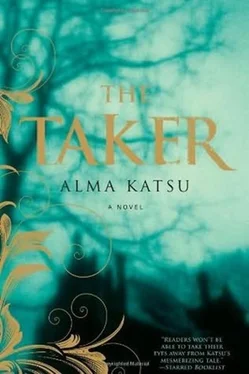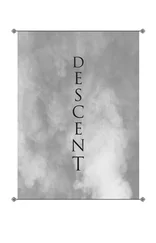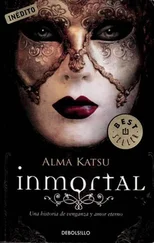Once I’d regained color, we found a café and ended up staying for hours. Over coffee and tumblers of Lillet and cigarettes (for me-though Jonathan the doctor disapproved), we sat in a booth and caught up on several lifetimes. The bush stories were fascinating and I was amazed that Jonathan could be so happy in a land as dry and sparse as Maine was cool and lush. That he could sit in a tent, patiently filling syringes without a thought to the mosquitoes buzzing around him. Malaria, West Nile, what did it matter to him? He volunteered to trek into a valley gripped by an outbreak of dengue fever. He’d carried antidiarrheals and other medicines on his back when the Land Rover couldn’t cross the river. As much as I admired what he did, the stories of putting himself in danger made me uncomfortable, even though such fears were irrational.
“How did you find me, after all this time, in all the world?” I asked him, finally, dying to know. He smiled cryptically, and took another sip of his aperitif.
“It’s a funny story. The short answer is technology-and luck. I’d been wanting to look you up for a long time, but struggled with this very question. How in the world could it be done? The answer began with a children’s book I happened to see at a colleague’s house-”
“ The Jade Pagoda ,” I guessed.
“ The Jade Pagoda ,” he answered, nodding. “Reading the book to the colleague’s child, I recognized you in the drawings. With a little research, I found the artist’s model-Beryl Fowles, a British expatriate living in Shanghai-”
“I always liked that name. Made it up myself.”
“-and hired someone to find out what he could about Beryl. But by then, Beryl Fowles had been gone for decades.”
“And yet you still found me.”
“I hired an investigator to track down who had inherited Beryl’s money, and so on and so on, but the trail ran cold eventually.”
“But you didn’t give up?”
Jonathan smiled at me again. “Here’s where technology comes in. You know about the photo-recognition software they have online these days, so you can try to find photos of yourself or friends on websites? Well, I tried it on one of the pictures in the book and damn if it didn’t work. It wasn’t easy, and I had to be persistent, but it came up with one match, a thumbnail photograph of the author of a little monograph on ancient Chinese teacups, of all things… I never would have thought you’d become an expert on Chinese porcelain. Anyway, your publisher told me how to contact you.”
The Chinese teacups entrusted to me by my employer in Shanghai, where I’d gone to work after posing for the children’s book. And so my last great adventure in China had led Jonathan back to me.
We ended up at my home by late afternoon, the champagne drunk and a cabernet three-quarters done along with the foie gras and toast. At Jonathan’s insistence, I showed him around the house, but I became more and more embarrassed with each room. I amazed even myself with the multitude of things acquired over the years, hoarded as a cushion against the relentless future. Jonathan said kind words, praised my foresight in saving rare and beautiful things for future generations, but he only meant to assuage my guilt. A bush doctor didn’t travel with a freighter’s worth of bric-a-brac. There was no storehouse of mementoes waiting for Jonathan’s return. I came across a box I hadn’t seen in nearly two decades, full of precious jewelry that had been given to me by admirers: a ring with a ruby the size of a grape; a stickpin with an heirloom blue diamond. The sight of such excess was sickening and I pushed it back in the forgotten bookcase where it had been moldering.
We came across worse: there was plunder, things I had spirited out of faraway countries during my frantic years. Surely Jonathan recognized them for what they were: beautifully carved Buddhas, hand-knotted rugs of twenty colors, ceremonial armor. Treasures I’d gotten in trade for long rifles or taken at gunpoint or-in some cases-stripped off the dead. All of it would go, I vowed, closing the doors to these rooms; every stick and statue would be sent off to museums, back to their native lands. How could I have lived so long with these things in my house, without even a thought to them?
The last room we toured was my bedroom on the top floor. It had the sad air of a room no longer used for its intended purpose. There was a Swedish headboard and bedstead beside a set of tall, narrow windows; the windows and the bed were draped in white cotton, an ice blue silk comforter thrown over the mattress. An eighteenth-century French secretary served as a computer table, spindly legs and all, with a Biedermeier chair pulled in front of it. The table was strewn with papers and knickknacks, a gray silk dressing gown was draped over the chair. All gave it the look of a room in which the dustcovers had only recently been pulled off the furniture, as though everything had been in waiting.
Jonathan stood in front of the picture that hung opposite the bed. The artist’s name was long lost, but I remembered the day the sketch had been made. Jonathan didn’t want to sit for the portrait but Adair had insisted, so he was caught leaning back churlishly in a chair, dark and moody and breathtaking. He thought he would spoil the picture but damn if it hadn’t made the drawing better. We both stood in front of it, taken back nearly two centuries.
“Of all the treasures you’ve amassed in this house… I can’t believe you kept this stupid drawing,” Jonathan said, weakly. When he saw the stricken look on my face, he softened and took my hand. “But of course you would… I’m glad you did.” We gave it one last look before walking out of the room.
By the time night had fallen, Jonathan was sprawled on a couch in the drawing room and I was on the floor, leaning against an armrest. We’d swapped stories for hours. I’d broken down and told him some of the past I was ashamed of: going out in search of adventure with the madman who’d taken Jonathan’s place when he left me. His name was Savva and he was one of us, one of Adair’s early companions, the only other one of us I’d ever run across. Savva had the misfortune of being found by Adair, centuries back, near St. Petersburg, stranded in a storm. Savva wouldn’t share the details of his falling-out with Adair, but I could guess at them, for Savva had a mercurial temper and a sharp, impatient tongue.
Because Savva couldn’t stand to be in any place for long, we’d roamed the continents like exiles. For a man who had been born into ice and snow, Savva was inexplicably drawn to heat and sun, which meant we spent most of our time in northern Africa and central Asia. We’d traveled with nomads across deserts, run guns through the Khyber Pass. Taught Bedouins to shoot the long rifle, even lived with the Mongols for a while (they had been impressed with Savva’s extraordinary equestrian skill during the chase to hunt them down). We were together, close as brother and sister, until the end of the nineteenth century. We just realized that we had nothing left to say to each other. We probably should have parted decades before, but it had been too easy being with someone who needed no explanations.
“And you.” I took the opportunity to change the subject, exhausted from dredging up those memories. “Surely you haven’t been alone this whole time. Did you ever marry again?”
He twisted his mouth but offered up nothing.
“Don’t tell me you’ve been lonely all this time? That would be too sad.”
“Well, I wouldn’t say lonely. You’re rarely alone if you’re a doctor in these villages, everyone needs your attention and they’re happy that you’re there… I was always being invited to eat with them, attend their observances. Partake of their lives.” His eyes dipped closed for longer and longer instances, and a languor settled on his face. I took a lap robe and spread it over him. He opened his eyes for a brief moment.
Читать дальше












